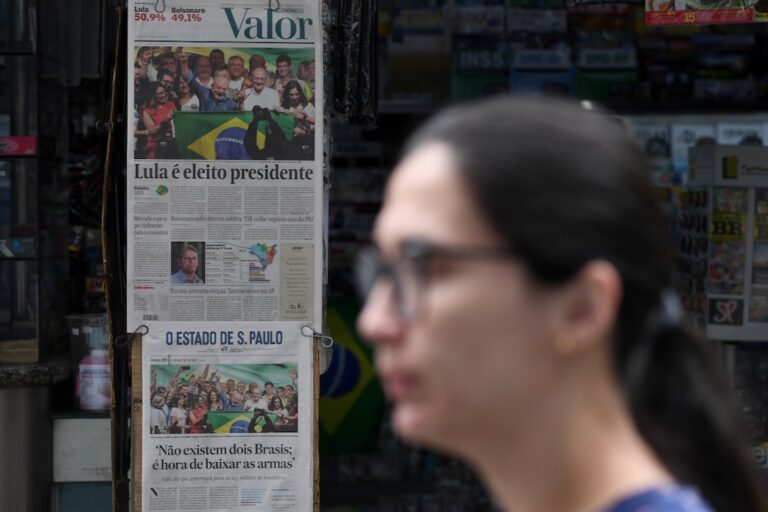Three serious cases of violence against journalists in different regions were reported within a few days of each other in early October.
(RSF/IFEX) – 19 October 2011 – The army’s attempts to “pacify” and secure Brazil’s favelas and crack down on their drug traffickers before the 2014 Football World Cup and 2016 Olympic Games are raising concern about the accompanying violations of human rights and civil liberties in these communities, including the rights of their own journalists.
News reporting by the residents of these poor neighbourhoods should enjoy the same safety guarantees and freedom from censorship as reporting by Brazil’s mainstream media.
A series of incidents this month in Complexo do Alemão, a conglomeration of 13 favelas in Rio de Janeiro, has set a disturbing precedent and highlighted a reluctance on the part of the military to accept grass-roots reporting.
They began on 2 October when favela reporter Patrick Granja filmed a video showing a resident being beaten up by eight soldiers ( http://www.youtube.com/user/patrickgranja#p/u/5/WzxZ-HP9_LA ). It circulated online and was posted on the websites of the newspaper A Nova Democracia (AND) ( http://www.anovademocracia.com.br/ ) and the Favela news agency, Agencia da Noticias das Favelas (ANF) ( http://www.anf.org.br/ ).
The next day, reporters from AND and ANF were censored in the same favela by soldiers ( http://www.youtube.com/watch?v=iZ-nzMzS_A4 ), who ordered them to stop filming. After being told they needed an army permit to film, the reporters were themselves filmed by the soldiers.
“Despite the army command’s subsequent apology and attempt to portray the incident as a ‘misinterpreted order,’ there are grounds for asking whether certain zones or neighbourhoods in Brazil are subject to a state of emergency in which the normal right to report news and information is suspended,” Reporters Without Borders said.
“We share the concern expressed by ANF. According to Complexo do Alemão’s inhabitants, restrictions were also imposed on an SBT TV crew. The fight against organized crime is necessary, but it should not lead to the creation of enclaves in which there is less respect for certain basic civil liberties than elsewhere. The defence ministry must be quite clear on this point.”
Brazil’s journalists are exposed to a great deal of violence in certain regions, especially when they work for local, community or alternative media. The same applies to bloggers. Since the start of the year, a total of four journalists have been killed in direct or probable connection with their work. Real efforts have been made to combat impunity in such cases but with mixed results.
Three serious cases of violence against journalists in different regions were reported within a few days of each other earlier this month. They require an urgent response from the authorities. The first was on 3 October, when shots were fired at the home of Cid Ferreira, the host of political and social programmes on community radio Araibú FM in Russas, in the northeastern state of Ceará.
Two days later, shots were fired at the car of Sérgio Ricardo de Almeida da Luz, a radio reporter who covers crime in Toledo, in the southern state of Paraná. Finally, on 9 October, journalist Antonio Carlos Ferrari was attacked in public in Itaporã, in the southwestern state of Mato Grosso do Sul, by two members of a rural land-owning family accused of using slave labour.


